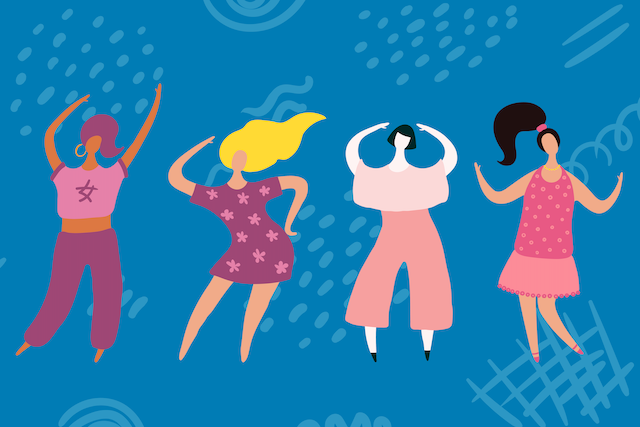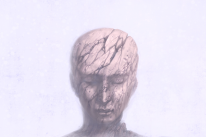
EDITOR’S NOTE: You can find a number of helpful coronavirus resources and all related Tiny Buddha articles here.
“Imagine if we obsessed about the things we loved about ourselves.” ~Unknown
I used to have a plaque with this quote prominently displayed in my waiting room. Sadly, it’s somehow gotten misplaced over the years.
What I remember most about the plaque was how it engaged, or disengaged, the people who noticed it. Did they mention the quote when they came into my office? Pointedly ignore it? Let me know that self-love is what they want for themselves? Or express skepticism that they would never get to that point in their relationships with their bodies (if they even had such a relationship)?
It was the latter group, primarily made up of women in their forties and fifties that I most loved to challenge.
“What’s your relationship with your body like?” or “When did you stop focusing on what you liked about your body,” I’d ask.
The answers I heard were often things like “My body changed after my pregnancy,” or “I hate seeing pictures of myself with wrinkles.”
As a woman who has surpassed the half century mark myself, I completely related—things aren’t quite the same as in my twenties.
Of course, focusing on the perfect body spans gender. Many men I know joke about or bemoan their “man boobs,” and people who identify as non-binary sometimes hate gendered body parts, like hips or breasts.
The world I know most intimately is my own, that of a mid-life woman. TV, magazines, and diet talk constantly remind me of the young, smooth, skinny ideal.
You would think that with a worldwide pandemic happening, these pressures would disappear. Well, they haven’t. Who’s seen the Facebook meme entitled “When You Meet Your Friends After Quarantine,” which shows toddler girls baring their admittedly adorable bellies which they bonk together? My takeaway: bellies may be cute on toddlers, but not on me.
Or what about the one that shows a much larger Little Debbie of snack cake fame now depicted as Big Deborah? The message: chubby cheeks and extra pounds are not attractive. Watch out. And then there’s talk of the dreaded quarantine fifteen and how to avoid it.
The message that I should hate my body is alive and well.
So how do I begin to combat these messages? The quote at the beginning reminds me to shift to my thinking to the positive. I’m working on it. I’ve started to ask myself hard questions. What’s positive about my body? What am I grateful for?
While I’ve found it helpful to think about these things, a gratitude journaling and practices have spurred the most movement toward the positive. The positive present, that is, rather than the losses of the past (like that flat teenage stomach) or the anxiety of the future “quarantine fifteen.”
Cultivating A Body Gratitude Practice
I offer my body gratitude in many ways. Journaling is one. Gratitude journals can be simple, such as a bulleted list of how I am grateful to my body (e.g., for health, mobility, endurance).
I can also answer questions more overarching questions like “How has my body been a friend through the years?”
As I ask these questions, I tune in to the sensations in my body. How do I feel in my body when I offer this gratitude? It’s often a lightness in my chest or a fullness in my heart.
It can be a challenge to keep a body gratitude journal, so I’d like to offer some examples.
I am grateful to my body for having the endurance to take a walk each day.
I am grateful to my body for persevering through a difficult pregnancy. Yes, it’s not the perfect body, but it’s given me the gift of a talented, unique daughter.
I also love to choose a daily card from Louis Hay’s “Healthy Body Deck.” It’s shifts my perspective when I read these gratitude affirmations and thank parts of my body I never considered.
For instance, one card says “I love my feet. I walk upon this planet safe and secure, always moving forward toward my good.” I never thought of all the things my feet do for me.
Some of the cards are funny, such as thanking my spleen for its role, but they help me to connect and laugh.
I also try to notice opportunities for gratitude throughout my day. During a recent grocery trip I was talking to a cashier, who described her fears about COVID-19. Her teenage son had struggled with some past health issues and she was concerned about him becoming sick. It reminded me to thank my body for having a great immune system that keeps my fear levels low, and it provided the basis for my nightly journal entry.
Finally, body gratitude practices can involve ritual. This is a work in progress for me, but I offer it to others as an alternative. Love baths? Fill a tub with warm water and bubbles, light some candles, and play some music. Take the time for a soak, letting your body have permission to relax and recharge and thanking yourself for getting through another day of keeping yourself and your family safe.
You—and your body—are doing a wonderful job getting through this crisis. Appreciating yourself can help you stay healthy and enable you to use this time for growth and self-connection.
About Heidi Dalzell
Heidi J. Dalzell, PsyD, is a Clinical Psychologist, specializing in eating disorders and trauma. Dr. Dalzell has a busy private practice focusing on treating midlife eating disorders of all kinds, with a special interest in helping midlife women to stop binge eating so that they feel more confident, allowing them to live the life they want. Dr. Dalzell also offers courses/eating disorder online coaching and is a prolific author on topics related to eating disorders, body image and spirituality.












 Though I run this site, it is not mine. It's ours. It's not about me. It's about us. Your stories and your wisdom are just as meaningful as mine.
Though I run this site, it is not mine. It's ours. It's not about me. It's about us. Your stories and your wisdom are just as meaningful as mine.
I love this article! In the article you mention Louis Hay’s “Healthy Body Deck.” Could that be a different title or name? I am unable to find that on the Hay House site. Thank you, Sarah
I see it is actually called, Louise Hay’s “Healthy Body Cards” – But hard to find! Thank you again for your lovely article!
Lovely reminders, thank you.